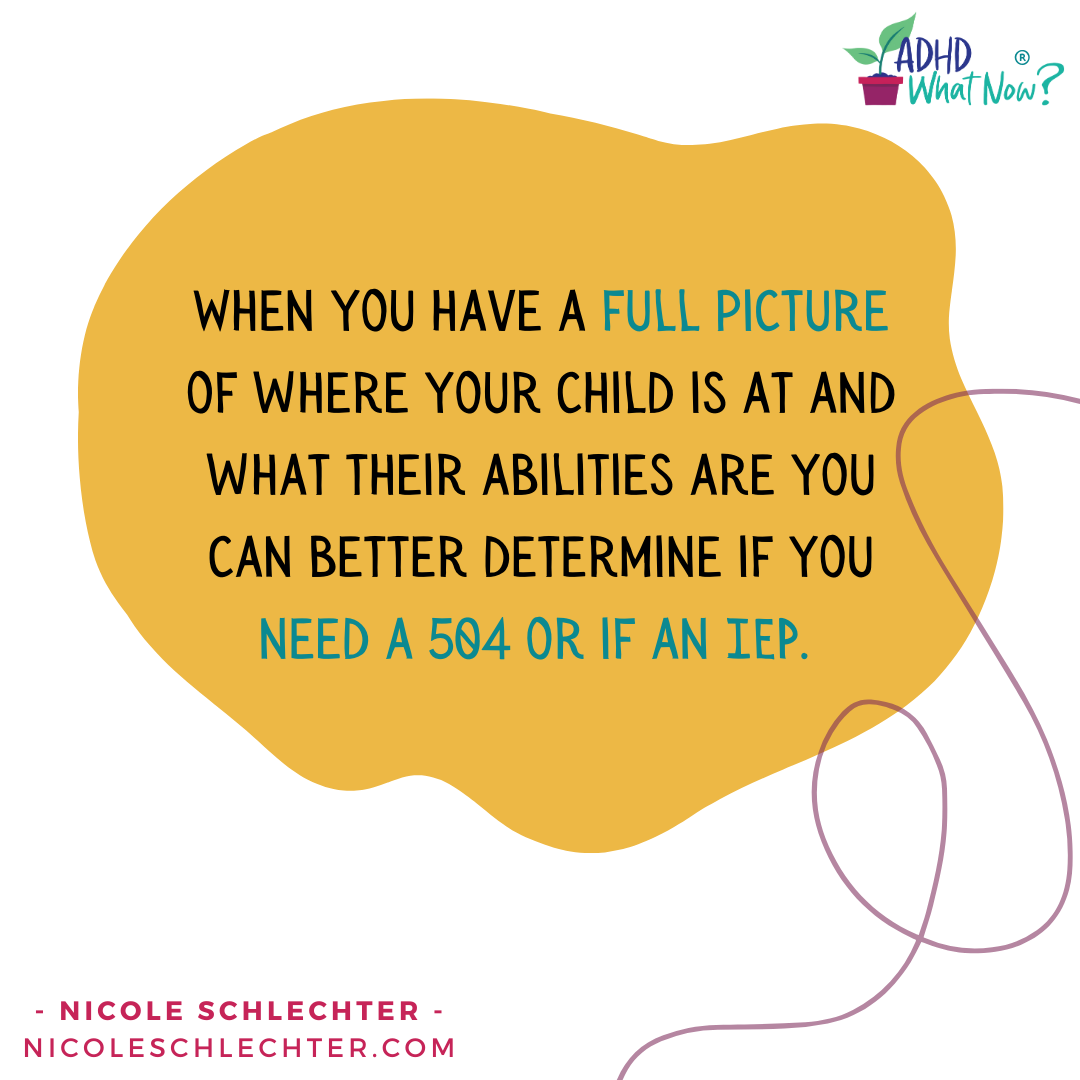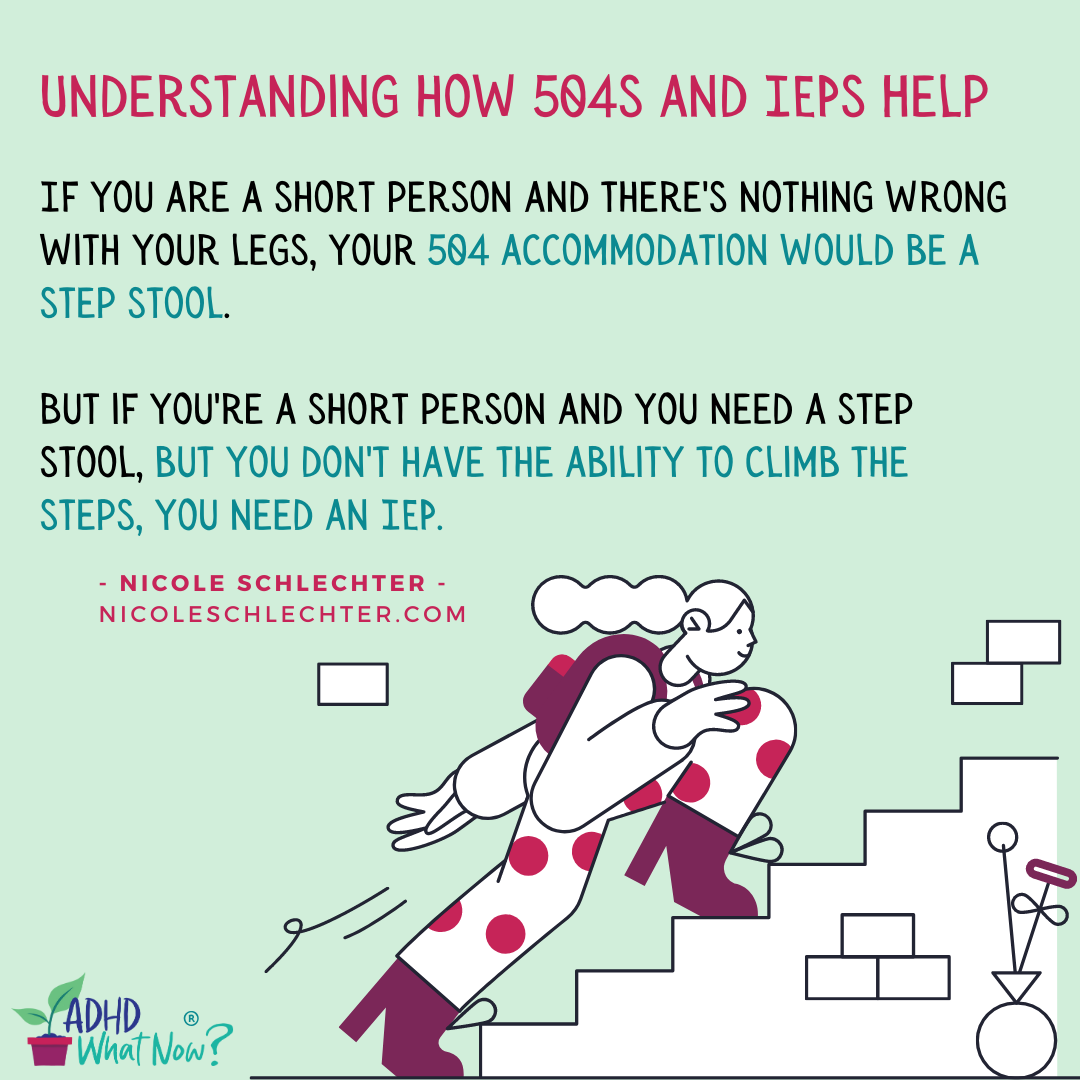What's the Difference Between a 504 or IEP?
Mar 28, 2023Are you a parent with a child who's just been diagnosed with ADHD and aren't sure where to start with 504s and IEPs?
Are you feeling lost and uncertain about the special education process, and unsure about what's best for your little one?
I know how overwhelming and confusing this can be. But I've got some great news for you. I've brought in one of the top educational advocates in the country, Nicole Schlechter, also known as the IEP mom, to help you navigate this process and find the best solution for your child.
As a former teacher, Nicole has a wealth of experience in the special education space, and she's dedicated her career to helping families like yours. She's here to break down the differences between Individualized Education Plans (IEPs) and 504 plans, and show you how to start the process of getting the support your child needs.
She'll guide you through every step of the way, from requesting a full comprehensive evaluation to identifying your child's abilities and needs.
Remember, you've got this! With the right guidance and support, you can help your child achieve their full potential and succeed in school and beyond.
See more from Nicole here:
Website: https://nicoleschlechter.com/
And connect with me, other parents, and guest experts in the Child with ADHD - What Now? Facebook group. https://www.facebook.com/groups/adhdwhatnow
SHAREABLE GRAPHICS




FULL TRANSCRIPT
Veronica: Have you been wondering how to support your kiddo at school? Perhaps they just got an ADHD diagnosis, or you're in the process of figuring that out, but you're wondering if there's any kind of either accommodations or extra supports that your child needs in school. That's all part of the special education process, and that's what we're going to cover here today.
My name's Veronica Hunter, the founder of ADHD - What Now? Passionate about helping you move forward with your unique choices for your unique family, supporting your kiddo with ADHD.
And today we have with us Nicole Schlechter. She's the IEP mom. You can find her website link above. She is raising her own kids with special needs. She was a teacher and she turned into an educational advocate, which means that she is the person that you can call if you want somebody to walk through the special education process with you at the school, or if you've come to the point where you decide you need some additional advice and another person on your team to figure out what your kiddo needs in the school system.
So without further ado, let me introduce her and she will tell you about IEPs, 504s, some key things you need to know and how to start the process for special education.
So getting into the topic at hand, then with IEPs, 504s, can you explain, there's so many questions about what are they, which way to go, what is typically the solutions we're talking specifically about, generally with ADHD or children who have ADHD. Take it from there.
Nicole: Yeah. So a lot of the times what I hear when kids are getting a new ADHD diagnosis is, oh, you have ADHD, you automatically get a 5 0 4, or you have ADHD, you need an IEP, and one is not necessarily better than the other. You're not guaranteed either one just because you have a diagnosis.
They just kind of do different things. So for a 504 plan, a 504 is something that is available to you in the workplace, in college, it goes beyond our school years, and those are just accommodations. So just things that you need to kind of help you along the way so that you can do the same thing that your peers are doing.
An IEP is just for our school aged kids, so preschool, elementary school, high school, and a little bit beyond. Depending on what your child's needs are. It does not follow us into college. And the IEP is more direct services. So we're identifying a skill deficit that needs direct instruction in order to bridge that gap.
Sometimes there's modifications in there. That's where you're gonna see annual goals and related services like social work and occupational therapy and things like that.
The best way that I can explain the differences is by using a step stool kind of analogy. If you are a short person and there's nothing wrong with your legs, you just can't see over the counter, you need a step stool to kind of help you, that would be your accommodation. But if you're a short person and you need a step stool, but you don't have the ability to climb the steps, you need an I E P. Those are those direct skills that we need to be teaching, that skill deficit that you don't have the skill to perform the way that's expected at school and beyond.
Veronica: That's awesome. I love that analogy. It really helps clarify.
Nicole: I didn't make that up, but it's good analogy. I, I could take credit for it, but it's not my analogy, but it is a good one.
Veronica: Awesome. So what's the process to start or how do you start this process of investigating?
Nicole: Right. So you don't need a diagnosis to have an IEP.
However, a lot of people who are watching this, I'm going to assume have ADHD or something similar. So once you do get that ball rolling, you want to ask for a full comprehensive evaluation. And what that means is that we've already identified that a 504 plan and an IEP, there's differences between the two of them, but one is not better than the other.
So opening up for that full comprehensive evaluation is going to look at all different areas of education. We're going to look at health, we're going to look at cognitive function, we're going to look at social emotional support, gross and fine motor skills, lots of different areas. And what we're doing is we're just drawing a picture of where your child is at and what their abilities are.
Based off of the results of those evaluations you can better determine if you just need a 504 with some accommodations or if an IEP with more direct instruction is gonna be more appropriate.
Veronica: Thank you, Nicole, for sharing all of that information. She is a wonderful resource in this specific area as an educational advocate. And if you would like to learn more from Nicole, she is also one of the presenters that we had on one of our ADHD - What Now? events.
And you can learn more about those at WhatNowADHD.com. As always, I'm cheering you on for each next step you take for yourself and for your kiddo. See you later.